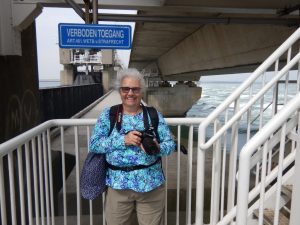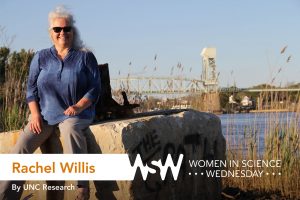Rachel Willis

Contact Information
Greenlaw Hall 414, CB #3520
University of North Carolina
Chapel Hill, NC 27599-3520
Rachel.Willis@unc.edu
Education
Ph.D. Economics, Northwestern University, 1990.
M.A. Economics, University of Notre Dame, 1978.
B.S. Economics, University of California at Riverside, 1977.
B.A. Political Science, University of California at Riverside, 1977.
Research Interests and Honors
Professor Rachel Willis is a Thorp Faculty Engaged Scholar working on port planning for climate change.
Her recent research “Water Over the Bridge” is profiled with a story and short video by Alyssa LaFaro in the October 2017 issue of Endeavors

A labor economist who has focused on access to work in the global economy in the past, her current research on global freight transportation planning for climate change in port cities is a result of recent fellowships at the Institute for Emerging Issues, the Institute for the Arts and Humanities, and the Global Research Institute. Sea-level rise, drought, rising global temperatures and increased storm severity threaten port communities, influence migration, alter global foodsheds and impact future access to work through complex water connections related to infrastructure. The critical need for planning and action to meet the challenges of building resilient communities at local and global levels is central to her Water Over the Bridge project. A recent presentation at the Maritime Risk Symposium and a short profile of her is on the Endeavors Women in Science series. Travel grants from the Global Education Center to European agencies, conferences, education and water sites along with her 2017 Thorp travel to learn more about how planning and education in the Netherlands and the UK relate to North Carolina’s coastal flooding protection, are leading to the development of two new permanent courses on “Rising Waters” and “Global Impacts on American Waters.”
Willis’ previous engaged scholarship projects on work access with respect to child care, education, transportation and disability have resulted in long-term university/community collaborations across North  Carolina. Rachel Willis has always conducted her research through collaborative engaged scholarship. With grants from the Russell Sage and Rockefeller Foundations and the Upjohn Institute, her focus on manufacturing workers resulted in Kids at Work: The Value of Employer-Sponsored On-Site Child Care Centers, coauthored with Connelly and DeGraff. In addition they have published “If You Build It, They Will Come: Parental Use of On-Site Child Care Centers” in Population Research and Policy Review and “The Value of Employer-Sponsored Child Care to Employees,” in Industrial Relations. Their published work on the textile industry includes “The Future of Jobs in the Hosiery Industry” in Low-Wage America: How Employers are Reshaping Opportunity in the Workplace. Willis and Connelly have also published “Keeping Good Job Opportunities in the Community” at the CPWO and Willis has published “Voices of Mill Workers: As Jobs Cross Borders and Border-Crossers Take Jobs” in The American South in a Global World. Earning the inaugural Bryan Award in 2000 for her 1990’s research on the Smart Start Childcare Legislation, she was also honored in 2002 by the Regional Transportation Authority for her decade plus policy work as an appointed transportation official and with THINK Transit. Her research on disability access to higher education is at http://access.unc.edu. With numerous grants and fellowships, Campus Compact honored Willis with the 2007 Sigmon Award. A 2007 Kauffman Entrepreneurial Fellow at the IAH, Willis was a GSK Transportation Policy Fellow at IEI in 2009 and now investigates global access to work with respect to freight transportation and water challenges.
Carolina. Rachel Willis has always conducted her research through collaborative engaged scholarship. With grants from the Russell Sage and Rockefeller Foundations and the Upjohn Institute, her focus on manufacturing workers resulted in Kids at Work: The Value of Employer-Sponsored On-Site Child Care Centers, coauthored with Connelly and DeGraff. In addition they have published “If You Build It, They Will Come: Parental Use of On-Site Child Care Centers” in Population Research and Policy Review and “The Value of Employer-Sponsored Child Care to Employees,” in Industrial Relations. Their published work on the textile industry includes “The Future of Jobs in the Hosiery Industry” in Low-Wage America: How Employers are Reshaping Opportunity in the Workplace. Willis and Connelly have also published “Keeping Good Job Opportunities in the Community” at the CPWO and Willis has published “Voices of Mill Workers: As Jobs Cross Borders and Border-Crossers Take Jobs” in The American South in a Global World. Earning the inaugural Bryan Award in 2000 for her 1990’s research on the Smart Start Childcare Legislation, she was also honored in 2002 by the Regional Transportation Authority for her decade plus policy work as an appointed transportation official and with THINK Transit. Her research on disability access to higher education is at http://access.unc.edu. With numerous grants and fellowships, Campus Compact honored Willis with the 2007 Sigmon Award. A 2007 Kauffman Entrepreneurial Fellow at the IAH, Willis was a GSK Transportation Policy Fellow at IEI in 2009 and now investigates global access to work with respect to freight transportation and water challenges.
Teaching Interests and Honors
Experiential learning via both service-learning and field study are at the core of nearly every course developed by Rachel Willis. New courses under development from her research on ports include “Rising Waters” and “Global Impacts on American Waters.” From the team-taught capstone course and field lab on “The Role of the University in American Life” to two distinct first year seminars on “Access to Higher Education” and “Navigating America”, Willis creates a dynamic curriculum that builds upon on and off-campus research. Upper division seminars on “Service Learning in America” and “Documenting Communities” require her students to engage in community research and service. Willis contributes to teaching outside the classroom including serving as the first faculty advisor for APPLES and as part of the Carolina Center for Public Service Committees that developed both the Public Service Scholar Program and the Faculty Engaged Scholars Program. In the first class of BRIDGES, she served on the board and developed the Curriculum for Academic Institutions. She has served as a faculty mentor for MURAP, as an Advisor for Honors and the Hmong Students Association of Carolina. In 2009 she was a lead scholar for the NC Humanities Council for the Teacher’s Institute.
In 2010, Willis was honored with the UNC Board of Governors Excellence in Teaching Award. Additional teaching honors include the William Friday Award and two Student Undergraduate Teaching Awards. In 1994, 2000, and 2014 she was a Chapman Fellow at the IAH and holds numerous other teaching honors from the University, Economics, and Student Affairs. From 2006 through 2011, she held the Bowman and Gordon Gray Professorship for Distinguished Undergraduate Teaching and currently holds an Adjunct Professorship in Economics and is an Affiliated Faculty in Global Studies.
Permanent Courses Taught
AMST 51: Navigating America
AMST 61: Navigating the World
AMST 275 & 275H: Documenting Communities
AMST 277 & 277H: Globalization and National Identity
AMST 285(ECON 285): Access to Work
AMST 394: The Role of the University in American Life
AMST 394L: Field Lab for the Role of the University
AMST 398: Service Learning in America
During the spring of 2018, Willis offered a special AMST 275H session of “Documenting Communities” that focused on the 2018 Clean Tech Summit community in collaboration with Professor Greg Gangi and his ENEC course. In addition, AMST 291 focused on “The Ethics of Climate Change”
Addition climate change courses in development: “Rising Waters” and “Global Impacts on American Waters” for 2018/19
